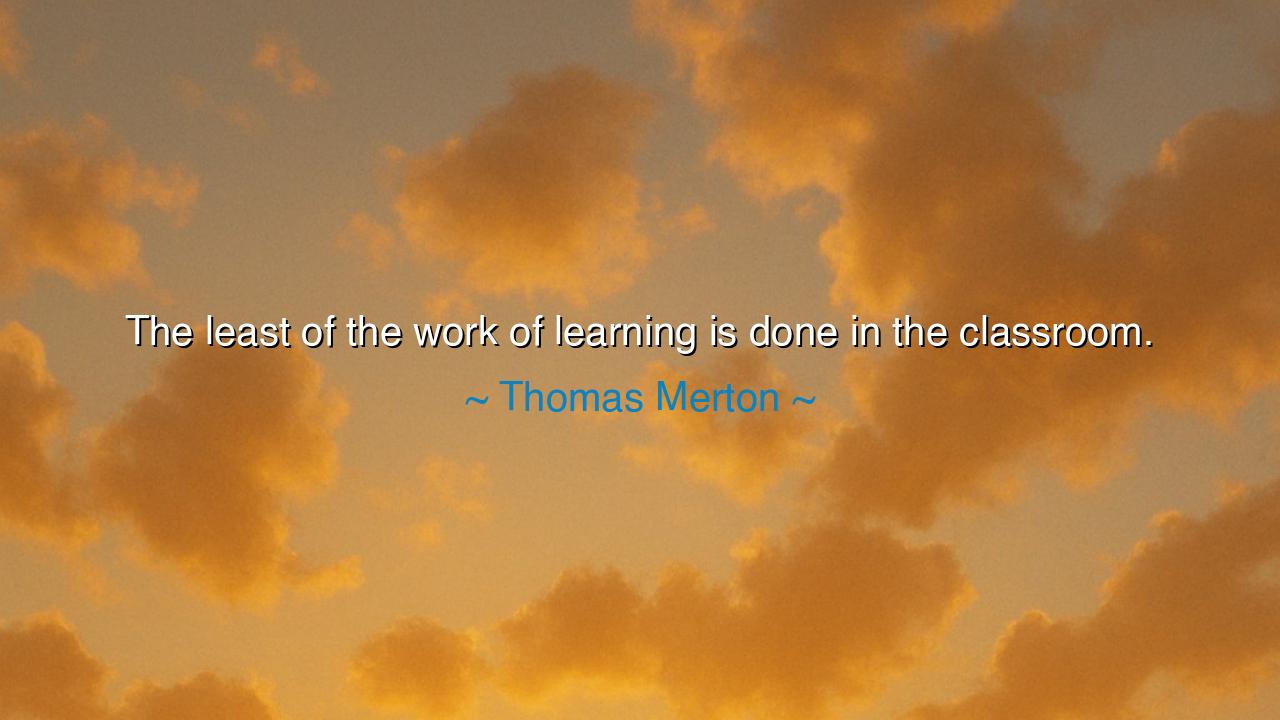
The least of the work of learning is done in the classroom.






“The least of the work of learning is done in the classroom,” said Thomas Merton, the monk, writer, and mystic who saw in silence and solitude the deepest education of the soul. In this deceptively simple truth, he reveals the eternal paradox of wisdom: that knowledge is not born where it is taught, but where it is lived. The classroom is but a doorway; what lies beyond it — the vast wilderness of experience, failure, reflection, and faith — is where the true labor of learning begins. Merton reminds us that education is not the filling of a vessel, but the lighting of a fire — a fire that must be tended by one’s own effort, humility, and desire for truth.
To understand Merton’s wisdom, one must first know his life. Born into a world of art and intellect, he found himself restless amid the noise of modern thought. Though trained in universities — the very halls of learning — he came to see that books and lectures could not satisfy the hunger of the spirit. He withdrew into monastic life, seeking not more teachers, but more silence. And there, in the cloister, he discovered that the heart learns far more in quiet contemplation than the mind does in argument. From this revelation sprang his insight: that the great work of learning is the transformation of the inner life — a work that no institution, no teacher, no textbook can complete for us.
When Merton says that “the least of the work” is done within the classroom walls, he does not despise study. Rather, he honors it as the beginning of the journey. But the classroom, he insists, is a place of preparation — not of completion. There, one gathers the tools of knowledge, the seeds of curiosity, the fragments of understanding. Yet unless these are taken into the soil of life — tested through pain, nourished through experience, and refined through reflection — they remain mere words. The greatest learning comes when the student becomes their own teacher, and the lessons of the world, of suffering, of beauty, and of love become the curriculum of the soul.
The ancients knew this truth long before Merton spoke it. Aristotle taught that we learn by doing — that virtue and understanding grow only through action. Confucius, in the East, echoed this wisdom: “I hear and I forget. I see and I remember. I do and I understand.” The sages of every land knew that the written word can only point toward wisdom; it cannot contain it. The sailor does not learn the sea from maps, nor the warrior from scrolls, nor the healer from theory alone. The map, the scroll, the lesson — all must be lived to become real. And so Merton, standing in the long tradition of the wise, reminds us that life itself is the true classroom, and every moment is a teacher waiting to be heard.
Consider the story of Mahatma Gandhi, who studied law in England — a place of books, structure, and theory — but did not truly learn the meaning of justice until he faced racial prejudice in South Africa. It was there, humiliated and awakened, that his education deepened beyond intellect into conviction. His learning came not from professors, but from experience, from reflection, and from pain. The law taught him to argue; life taught him to act. And in that alchemy of knowledge and suffering, he became a man who could lead nations. Gandhi, like Merton, embodied the truth that the greatest lessons come not from teachers, but from trials.
There is a quiet heroism in this way of learning. For it requires humility — the courage to fail, to listen, to begin again. The student who confines their learning to the classroom becomes a scholar of words but a stranger to wisdom. But the one who carries their learning into the world becomes a servant of truth. They study not only what is written, but what is lived — the language of faces, the patterns of nature, the whispers of the heart. Merton teaches that the classroom opens the door, but it is life itself that leads us through it — and that walking this path is the true work of the spirit.
So let this be the lesson, O seeker of understanding: learn beyond the classroom. Read, yes — but also walk, observe, and listen. Let the storms of failure and the calm of joy both be your teachers. In conversation with others, find wisdom; in solitude, find clarity. When you work, work mindfully; when you suffer, let it teach you patience; when you love, let it teach you humility. For as Thomas Merton teaches, the greatest education is not earned through degrees or titles, but through awareness — through the lifelong effort to see, to understand, and to live truthfully.
Therefore, do not mistake the classroom for the summit of knowledge — it is only the foothill. Beyond its walls stretch the mountains of wisdom, waiting to be climbed by those who are willing to live what they have learned. Carry your books in your mind, but your lessons in your heart. For the least of the work is done in study — and the greatest, in the sacred labor of living.






AAdministratorAdministrator
Welcome, honored guests. Please leave a comment, we will respond soon